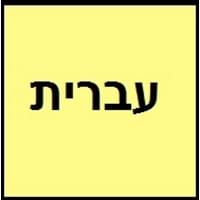Hebrew vs Catalan
- The original language of Bible is Hebrew.
- The men and women use different verbs in hebrew language.
- Catalan is 6th most largely spoken Romance language.
- Catalan went through a golden age in low middle ages, reaching a peak of maturity and cultural richness.
Hebrew and Catalan Language History
Comparison of Hebrew vs Catalan language history gives us differences between origin of Hebrew and Catalan language. History of Hebrew language states that this language originated in 1000 BC whereas history of Catalan language states that this language originated in c. 1028. Family of the language also forms a part of history of that language. More on language families of these languages can be found out on Hebrew and Catalan Language History.
Hebrew and Catalan Greetings
People around the world use different languages to interact with each other. Even if we cannot communicate fluently in any language, it will always be beneficial to know about some of the common greetings or phrases from that language. This is where Hebrew and Catalan greetings helps you to understand basic phrases in Hebrew and Catalan language. Hebrew word for "Hello" is שלום (Shalom) or Catalan word for "Thank You" is Gràcies. Find more of such common Hebrew Greetings and Catalan Greetings. These greetings will help you to be more confident when conversing with natives that speak these languages.
Hebrew vs Catalan Difficulty
The Hebrew vs Catalan difficulty level basically depends on the number of Hebrew Alphabets and Catalan Alphabets. Also the number of vowels and consonants in the language plays an important role in deciding the difficulty level of that language. The important points to be considered when we compare Hebrew and Catalan are the origin, speaking countries, language family, different greetings, speaking population of these languages. Want to know in Hebrew and Catalan, which language is harder to learn? Time required to learn Hebrew is 44 weeks while to learn Catalan time required is 24 weeks.





